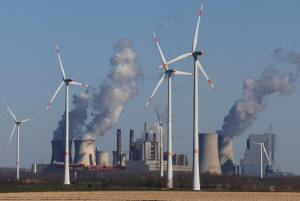Europe races to prepare for energy crunch this winter
 Send a link to a friend
Send a link to a friend
 [September 19, 2022]
By Tassilo Hummel, Inti Landauro and Miranda Murray [September 19, 2022]
By Tassilo Hummel, Inti Landauro and Miranda Murray
PARIS/MADRID/BERLIN (Reuters) - European
governments outlined new measures on Monday to cope with potential
energy shortages this winter and raced to improve energy networks to
share power, with Russian gas flows still running at severely reduced
rates amid the Ukraine war.
Spain drew up plans that could force energy-intensive industries to shut
at peak demand times, France said it was preparing to send gas to
Germany from October, while Berlin said Europe's powerhouse was still in
talks on state aid for ailing utility Uniper.
German buyers briefly reserved capacity on Monday to receive Russian gas
via the Nord Stream 1 pipeline, once one of Europe's major gas supply
routes, for the first time since the line was shut three weeks ago. But
they soon dropped the requests.
It was not immediately clear why buyers had submitted requests for
capacity when Russia has given no indication since it shut the line that
it would restart any time soon.
Russia, which had supplied about 40% of the European Union's gas before
its February invasion of Ukraine, has said it closed the pipeline
because Western sanctions hindered operations. European politicians say
that is a pretext and accuse Moscow of using energy as a weapon.

European gas prices have more than doubled from the start of the year
amid a decline in Russian supplies.
Russian gas flows to Europe via Ukraine, although much reduced, have
nevertheless continued.
But the sharp drop in Russian fuel exports, in retaliation for Western
sanctions over Moscow's invasion of Ukraine, has left governments
scrambling to find energy resources, but also to warn that power cuts
could happen, amid fears of recession.
The German economy is contracting already and will likely get worse over
the winter months as gas consumption is cut or rationed, the country's
central bank said on Monday. It added that the economy was likely to
shrink, even if outright rationing is avoided, as companies cut or halt
production.
In France, exports of natural gas to Germany could start around Oct. 10,
the head of France's CRE energy regulator said, following an
announcement by President Emmanuel Macron that the two EU neighbours
would help each other with electricity and gas flows amid the crisis.
"Gas was (until now) only flowing from Germany to France, so we did not
have the technical tools to reverse the flows and we did not even have a
method to regulate prices," CRE chief Emmanuelle Wargon told franceinfo
radio.

[to top of second column]
|

Wind power stations of German utility
RWE, one of Europe's biggest electricity companies are pictured in
front of RWE's brown coal fired power plants of Neurath near
Jackerath, north-west of Cologne, Germany, March 18, 2022.
REUTERS/Wolfgang Rattay

'NEVER'
While French energy group EDF is racing to repair corrosion-hit
nuclear reactors, "exceptional" measures this winter could include
localised electricity cuts if the winter is cold and EDF's plans are
delayed, Wargon said.
"But there will be no gas cuts for households. Never," she said.
Spanish Industry Minister Reyes Maroto said that obliging
energy-intensive companies to close down during consumption peaks is
an option on the table this winter if required.
The companies would be compensated financially, she said in an
interview with Spanish news agency Europa Press, adding there is no
need to impose such closures now.
And Finns were warned they should be prepared for power outages.
"As a result of great uncertainties, Finns should be prepared for
power outages caused by a possible power shortage in the coming
winter," national grid operator Fingrid said.
Reflecting the disruptions caused across the continent, Finnish
power retailer Karhu Voima Oy said it had filed for bankruptcy due
to a sharp rise in electricity price rises.
'GOING BACK IN TIME'
Europe's imports of thermal coal in 2022 could be the highest in at
least four years and may rise further next year, analysts said on
Monday, highlighting the extent of the energy crisis following
sanctions on top supplier Russia.
European imports of thermal coal this year could rise to about 100
million tonnes, the most since 2017, according to Noble Resources
International Pte Ltd, while commodities pricing agency Argus
expects shipments to reach a four-year high.
"Europe is going back in time," Rodrigo Echeverri, head of research
at Noble, told a conference.

Meanwhile oil prices fell by more than 1% on Monday, pressured by
expectations of weaker global demand and by U.S. dollar strength
ahead of a potentially large interest rate hike, though supply
worries limited the decline.
Oil has also come under pressure from forecasts of weaker demand,
such as last week's forecast from the International Energy Agency
that the fourth quarter will see zero demand growth.
(Reporting by Reuters bureaus; Writing by Ingrid Melander; Editing
by Edmund Blair and Mark Heinrich)
[© 2022 Thomson Reuters. All rights
reserved.]
This material may not be published,
broadcast, rewritten or redistributed.
Thompson Reuters is solely responsible for this content. |